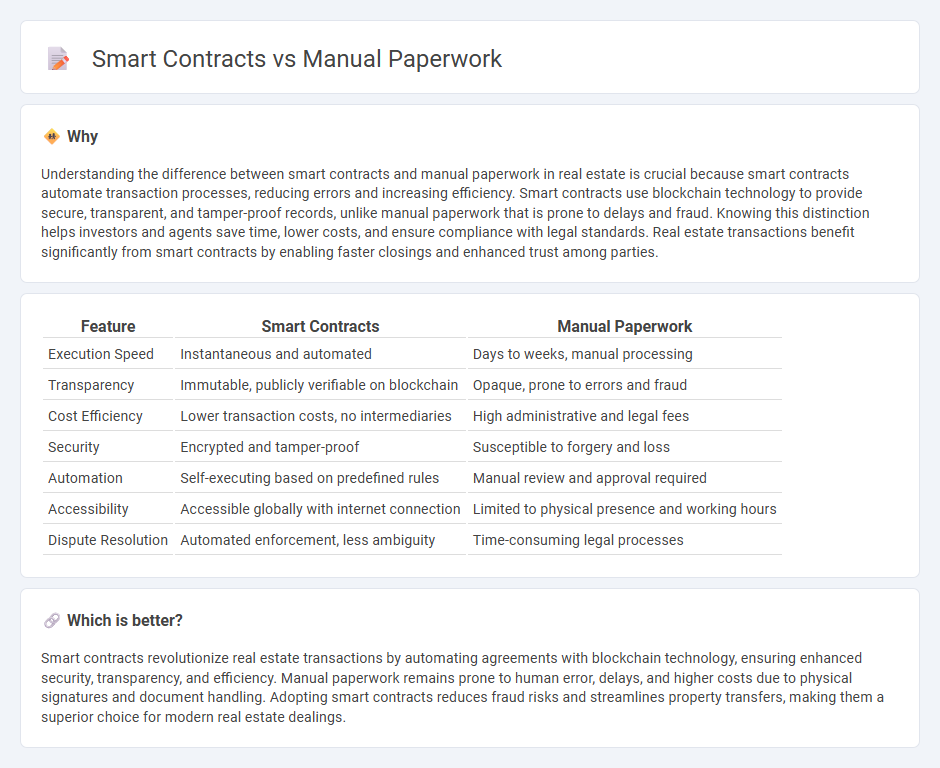
Smart contracts automate real estate transactions by securely recording agreements on blockchain, eliminating delays and reducing errors common in manual paperwork. Manual processes rely heavily on physical documents and human oversight, increasing the risk of fraud and prolonged closing times. Discover how smart contracts can revolutionize property dealings and streamline your next transaction.
Why it is important
Understanding the difference between smart contracts and manual paperwork in real estate is crucial because smart contracts automate transaction processes, reducing errors and increasing efficiency. Smart contracts use blockchain technology to provide secure, transparent, and tamper-proof records, unlike manual paperwork that is prone to delays and fraud. Knowing this distinction helps investors and agents save time, lower costs, and ensure compliance with legal standards. Real estate transactions benefit significantly from smart contracts by enabling faster closings and enhanced trust among parties.
Comparison Table
| Feature | Smart Contracts | Manual Paperwork |
|---|---|---|
| Execution Speed | Instantaneous and automated | Days to weeks, manual processing |
| Transparency | Immutable, publicly verifiable on blockchain | Opaque, prone to errors and fraud |
| Cost Efficiency | Lower transaction costs, no intermediaries | High administrative and legal fees |
| Security | Encrypted and tamper-proof | Susceptible to forgery and loss |
| Automation | Self-executing based on predefined rules | Manual review and approval required |
| Accessibility | Accessible globally with internet connection | Limited to physical presence and working hours |
| Dispute Resolution | Automated enforcement, less ambiguity | Time-consuming legal processes |
Which is better?
Smart contracts revolutionize real estate transactions by automating agreements with blockchain technology, ensuring enhanced security, transparency, and efficiency. Manual paperwork remains prone to human error, delays, and higher costs due to physical signatures and document handling. Adopting smart contracts reduces fraud risks and streamlines property transfers, making them a superior choice for modern real estate dealings.
Connection
Smart contracts automate agreements in real estate by encoding terms directly into blockchain technology, reducing reliance on manual paperwork. Traditional manual documentation involves physical signatures and filing, which increases processing time and risks of errors or fraud. By integrating smart contracts, the industry enhances transparency, speeds up transactions, and minimizes the complexities of manual paperwork.
Key Terms
Efficiency
Manual paperwork often leads to delays and errors in contract processing, increasing operational costs and reducing overall efficiency. Smart contracts automate transactions through blockchain technology, enabling faster, transparent, and tamper-proof agreements that eliminate the need for intermediaries. Explore how smart contracts can revolutionize your business efficiency and reduce administrative burdens.
Security
Manual paperwork often suffers from human errors, unauthorized alterations, and difficulty in traceability, posing significant security risks. Smart contracts utilize blockchain technology to ensure tamper-proof execution, transparent auditing, and automated enforcement of terms, drastically reducing fraud and unauthorized access. Discover how smart contracts can transform secure transactions by exploring their advantages in-depth.
Transparency
Manual paperwork in contract management often leads to errors, delays, and limited visibility into transaction histories, reducing overall transparency. Smart contracts utilize blockchain technology to automate agreements, providing an immutable, real-time ledger accessible to all participants, ensuring enhanced clarity and trust. Explore how smart contracts revolutionize transparency in agreements for your business.
Source and External Links
The Frightening Reality Of Manual Document Processes - Manual document processes are slow, error-prone, and costly, highlighting the need for digital alternatives.
Say Goodbye to Manual Paperwork - Document automation transforms operational efficiency by eliminating the inefficiencies and frustrations associated with manual paperwork.
Manual Paper Forms Versus Electronic Forms - Electronic forms improve business efficiency and accuracy compared to manual paper forms, which are limited in terms of data collection and processing.
 dowidth.com
dowidth.com